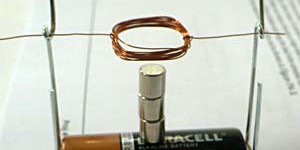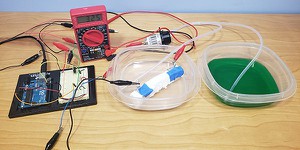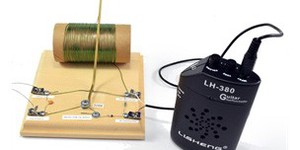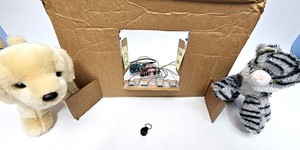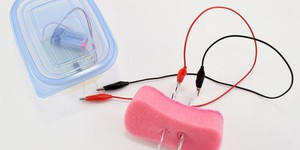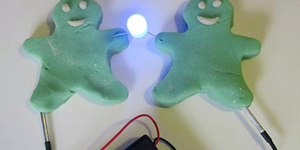Electricity & Electronics Science Projects (30 results)
Stop for a minute and try to imagine your world without electrical power and electronic gadgets.
No convenient appliances in the kitchen, no electric lights. No computers, MP3 players, television, or video games.
Your life would be completely different, wouldn't it? Electricity and electronics are so central to modern life that, paradoxically, they're easy to overlook.
|
Select a resource
Sort by
|
When you think of a motor, you may immediately think of a car, but you actually encounter other motors in your home every day. That's right, if you put on clean clothes from the washing machine, ate food from the fridge, or used a fan, you used an electric motor. In this electronics science project, you will make a simple electric motor with two magnets that "talk" to each other. As they interact, they will alternate between "liking" each other (pulling together), and "disliking" each other…
Read more
Featured
Have you heard that garlic powder is supposed to inhibit the growth of bacteria? Which do you think would make a better disinfectant: a solution of garlic powder or a solution of bleach? This project shows you a straightforward way to compare the effectiveness of different disinfectants (or other antimicrobial agents), by measuring zones of inhibition on a culture plate.
Read more
Remembering to take medicine at the right time can be hard, especially if you need to take multiple medications at different times of day. It might not be a big deal if you forget to take your daily multivitamin, but for some people, forgetting to take medication at the right time can be dangerous. What if you had a device that could not only set off an alarm at the right time, but also automatically dispense the right pills for you? In this project, you will build an automatic medicine…
Read more
New
Have you ever noticed that on a hot day, it's more comfortable to wear a light-colored shirt than a dark one? Or that it's cooler in a park than walking down a street? This happens because different surfaces absorb and reflect heat in different ways. Urban heat islands are parts of cities where man-made surfaces like pavement and buildings replace natural surfaces like grass and trees. In this project, you will use temperature and satellite data to see if certain areas in a city have higher…
Read more
You may be familiar with permanent magnets—the kind that hang on a refrigerator. But did you know that other magnets, called electromagnets, can be turned on and off? When turned on, electromagnets act just like permanent magnets, but if you turn them off, their magnetic properties disappear. Electromagnets are an important part of many electronic devices, like motors, loudspeakers, and hard drives. You can create an electromagnet with a simple coil of wire and a battery. In this project,…
Read more
"Alexa, turn on the lights!" Sometimes it is easy to take the technology around us for granted. But have you ever wondered how a smart speaker like an Amazon Echo® knows what you are saying and how it can control lights and appliances in your home? It can seem like magic if you buy a device that just works when you open the box. In this project, you will learn how it works. You will build your own smart home device to control an appliance with voice commands using an Arduino®. Get…
Read more
Imagine if you had to take medicine every time you ate, and you had to use a math formula to figure out how much medicine to take based on the nutritional makeup of the food, how you were feeling, and what activities you were planning to do. You might also need extra medicine throughout the day (even in the middle of the night) based on your blood glucose levels. People with diabetes who take insulin do this every day. They use finger sticks and blood glucose meters or a continuous glucose…
Read more
New
Engineers are trying to tackle the world's ocean pollution problem using robots. Some robots, like Mr. Trash Wheel and the ship featured in this Mark Rober video, are stationary and collect trash as it flows out of rivers before it gets into the ocean. Others, like the Jellyfishbot, are mobile and can squeeze into narrower spaces to collect trash:
Can you build and test your own trash-skimming robot? If you do not have access to a natural body of water to test it in, you can use a bathtub or a…
Read more
Have you ever wondered how a radio can grab signals that are transmitted through the air and convert them into sound? In this science project, you will build your own AM radio receiver from scratch and use it to listen to AM radio broadcasts. With your crystal radio you will be able to experiment with the circuit and the antenna to get the best reception.
Read more
Does your dog get bored when you are not home? Do you ever toss them a few treats right before you head out the door? What if you could keep them busy by automatically dispensing treats throughout the day? What about training them to sit in a certain place or even press a button by automatically rewarding them with treats? In this project you will build your own automatic dog (or cat, or other pet) treat dispenser that you can customize to react to different sensors.
Read more
Does your home have any pet doors or gates for dogs, cats, or other animals? Some automatic pet doors can be set up to allow only certain animals through. These doors can help you control which pets are able to go outside alone or which ones have access to specific food, litter boxes, or toys. But why buy such a door when you can make one? In this project you will build your own automatic pet door that works with a magnetic collar tag. Exactly how you use it is up to you!
Read more
Water is a valuable resource, and water shortages are a serious problem in many parts of the world. The problem can be made worse by people who waste water; for example, by watering a garden or using sprinklers on their lawn (or a farmer taking care of an entire field) when it has rained recently or the soil is already moist. How can you help conserve water and prevent such waste? One way is to build an electronic soil moisture sensor. This project will show you how to build a circuit that…
Read more
Do you like playing with play dough; or modeling clay? Wouldn't it be cool if you could add lights, sound, or even motion to your play dough creations? In this project, you will use play dough that conducts electricity, which will allow you to connect lights to your sculptures!
This project is the first in a three-part series on play dough circuits, which can all be done with the same materials. We recommend doing the projects in order.
Read more
|
Explore Our Science Videos
Explore How we Breathe
Build a Light-Tracking Bristlebot
Why Do Apples and Bananas Turn Brown? - STEM activity



